My Favourite Character…
By Newsline Admin | Featured People | Published 7 years ago
Ghazi Salahuddin, journalist
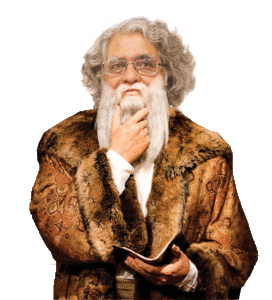 There I was, basking in the glory of Zaha Hadid’s Heydar Aliyev Centre in Baku, Azerbaijan, when it suddenly struck me, in the twilight of my life, no less: why wasn’t I an architect? Then a stream of ideas and images surged in my mind. I had read Ivo Andric’s The Bridge on Drina in the sixties and had a story-book opportunity to see the bridge itself, located in Bosnia, in the eighties. I thought of my repeated encounters with Istanbul, arguably the most beautiful city in the world not just because of its location but also its architectural heritage. I remembered Mera Sultan, the Turkish serial about the times of Suleiman the Magnificent, that we had seen dubbed in Urdu. Also, I recalled scenes from Elif Shafak’s enticing novel The Architect’s Apprentice. All this added up to one conclusion: I wish I were Mimar Sinan, the grand Ottoman architect of the sixteenth century. His father was a stonemason and because of my own beginnings, I would never imagine myself as a prince. But Sinan was more than a prince and the kingdom he created with the power of his imagination continues to exist in reality.
There I was, basking in the glory of Zaha Hadid’s Heydar Aliyev Centre in Baku, Azerbaijan, when it suddenly struck me, in the twilight of my life, no less: why wasn’t I an architect? Then a stream of ideas and images surged in my mind. I had read Ivo Andric’s The Bridge on Drina in the sixties and had a story-book opportunity to see the bridge itself, located in Bosnia, in the eighties. I thought of my repeated encounters with Istanbul, arguably the most beautiful city in the world not just because of its location but also its architectural heritage. I remembered Mera Sultan, the Turkish serial about the times of Suleiman the Magnificent, that we had seen dubbed in Urdu. Also, I recalled scenes from Elif Shafak’s enticing novel The Architect’s Apprentice. All this added up to one conclusion: I wish I were Mimar Sinan, the grand Ottoman architect of the sixteenth century. His father was a stonemason and because of my own beginnings, I would never imagine myself as a prince. But Sinan was more than a prince and the kingdom he created with the power of his imagination continues to exist in reality.
Tim Hannigan, travel writer
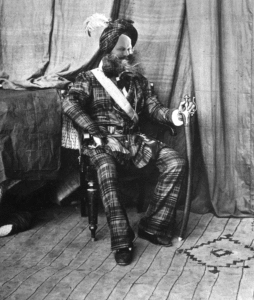 Most of the figures I find fascinating are people whose lives were neither particularly comfortable, nor entirely admirable – be careful what you wish for! But if I had to choose, I’d go for the gloriously disreputable 19th-century mercenary-adventurer, Alexander Gardner, the man in the tartan turban. By his own account, Gardner served in the armies of Afghans, Sikhs and Dogras, crossed the Pamirs in the dead of winter, and casually traversed Gilgit-Baltistan long before the first stiff-lipped imperial explorers made it over the passes. And miraculously, given his lifestyle, he died of old age, in 1877, comfortably retired in Kashmir.
Most of the figures I find fascinating are people whose lives were neither particularly comfortable, nor entirely admirable – be careful what you wish for! But if I had to choose, I’d go for the gloriously disreputable 19th-century mercenary-adventurer, Alexander Gardner, the man in the tartan turban. By his own account, Gardner served in the armies of Afghans, Sikhs and Dogras, crossed the Pamirs in the dead of winter, and casually traversed Gilgit-Baltistan long before the first stiff-lipped imperial explorers made it over the passes. And miraculously, given his lifestyle, he died of old age, in 1877, comfortably retired in Kashmir.
What I find so appealing about Gardner (despite his sometimes appalling actions) is that he was a living anachronism in the age of high imperialism. He belonged, not simply to the 18th-century era of the ‘white Mughals,’ but to a much earlier period – that of Ibn Battuta and Marco Polo, when a world traveller approaching from any angle could step into Central Asia without being a manifestation of imperial ambition, dubious power or global geopolitics. And if he survived, he’d come back with stories to tell.
Of course, there is a very big question-mark over the veracity of many of Gardner’s own tales. But that’s the main reason I’d like to be him – I’d get to find out just which of his alleged exploits really happened. In the end, he was either one of the 19th century’s greatest travellers, or one of its greatest storytellers – both fine things to be.
I.A. Rehman, human rights activist
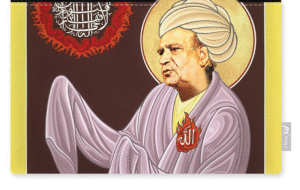 I am not very keen to be reborn on a planet where intrigue is synonymous with wisdom and shedding one another’s blood is the most respected vocation and pastime, but if I must have a second life I would like to be born as Mansur el-Hallaj. This is because I am fascinated by the quality of Mansur’s mind – that he could make short work of theological sophistry by declaring Ana el-Haq and I wish to relish the beat of his heart that preferred death with truth on his lips, to a life steeped in falsehood and hypocrisy. I also want to have a fresh trial of Mansur and to establish that what he had said of divinity was not a dervish’s rant in a moment of ecstasy, but the fruit of his learning and intuition. His jealous rivals could not forgive him for showing how small they were.
I am not very keen to be reborn on a planet where intrigue is synonymous with wisdom and shedding one another’s blood is the most respected vocation and pastime, but if I must have a second life I would like to be born as Mansur el-Hallaj. This is because I am fascinated by the quality of Mansur’s mind – that he could make short work of theological sophistry by declaring Ana el-Haq and I wish to relish the beat of his heart that preferred death with truth on his lips, to a life steeped in falsehood and hypocrisy. I also want to have a fresh trial of Mansur and to establish that what he had said of divinity was not a dervish’s rant in a moment of ecstasy, but the fruit of his learning and intuition. His jealous rivals could not forgive him for showing how small they were.
I want to use Mansur’s qualities of head and heart to stop the decline of the Muslims of Pakistan into the abyss of religiosity that is threatening to blight the lives of many generations.
Pervez Hoodbhoy, nuclear physicist
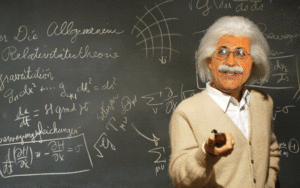 It’s actually a no-brainer – every self-respecting male physicist, me included, wants to be reborn as Albert Einstein. But hang on! Although Einstein used math to tell us ordinary physicists what time and space really are, he wasn’t a super mathematician. And so, mixed with my Einstein genes, I’d like to order a three-in-one cocktail of math geniuses: Carl Friedrich Gauss, Leonard Euler, and our very own Srinivas Ramanujan. Unfortunately these folks were probably dumb as sheep when it comes to understanding what makes society tick and so I’d want added in a dash of the genius genes of Abdur Rahman Ibn-e-Khaldun, Karl Marx, and Noam Chomsky. So far so good, but these guys didn’t know beans about writing fiction or drama – and it’s a damn good thing they didn’t even try. And so please add to my gene brew a few of my favorites: William Shakespeare, Gabriel Garcia Marquez and Saadat Hasan Manto. However, I suspect they could sing no more sweetly than crows; clearly I’d want to do a lot better if I’m to become a pop star also and be surrounded by adoring chickies. Well, dear God, I know I can’t ask You for anything really racy – or even for being Elvis Presley or Pat Boone but can I have a voice at least as good as that of K.L. Saigal, Muhammad Rafi, or Mehdi Hasan? Although I haven’t quite reached the end of my wish list, this will do for now. I promise to be more explicit in the reincarnation after the next. Let’s stay in touch.
It’s actually a no-brainer – every self-respecting male physicist, me included, wants to be reborn as Albert Einstein. But hang on! Although Einstein used math to tell us ordinary physicists what time and space really are, he wasn’t a super mathematician. And so, mixed with my Einstein genes, I’d like to order a three-in-one cocktail of math geniuses: Carl Friedrich Gauss, Leonard Euler, and our very own Srinivas Ramanujan. Unfortunately these folks were probably dumb as sheep when it comes to understanding what makes society tick and so I’d want added in a dash of the genius genes of Abdur Rahman Ibn-e-Khaldun, Karl Marx, and Noam Chomsky. So far so good, but these guys didn’t know beans about writing fiction or drama – and it’s a damn good thing they didn’t even try. And so please add to my gene brew a few of my favorites: William Shakespeare, Gabriel Garcia Marquez and Saadat Hasan Manto. However, I suspect they could sing no more sweetly than crows; clearly I’d want to do a lot better if I’m to become a pop star also and be surrounded by adoring chickies. Well, dear God, I know I can’t ask You for anything really racy – or even for being Elvis Presley or Pat Boone but can I have a voice at least as good as that of K.L. Saigal, Muhammad Rafi, or Mehdi Hasan? Although I haven’t quite reached the end of my wish list, this will do for now. I promise to be more explicit in the reincarnation after the next. Let’s stay in touch.
Akbar S. Ahmad, Ibn Khaldun Chair of Islamic Studies, American University
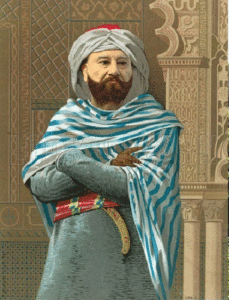 If given the chance, I would like to be the friend and companion who accompanied young prince Abdur Rahman, the founder of the Umayyad Dynasty of Spain, across the Middle East and North Africa, on his way to his new home in Andalusia in the 8th century A.D. The new Abbasid rulers had staged a coup in Damascus and killed many members of the Umayyad family – Abdur Rahman was the only survivor. Escaping from Syria, he galloped away, pursued by Abbasid assassins.
If given the chance, I would like to be the friend and companion who accompanied young prince Abdur Rahman, the founder of the Umayyad Dynasty of Spain, across the Middle East and North Africa, on his way to his new home in Andalusia in the 8th century A.D. The new Abbasid rulers had staged a coup in Damascus and killed many members of the Umayyad family – Abdur Rahman was the only survivor. Escaping from Syria, he galloped away, pursued by Abbasid assassins.
He would travel across rivers and deserts, cross the Strait of Gibraltar, and finally arrive in Cordoba, where he would found the Umayyad Dynasty, which would become one of the greatest in history, with marvels of art, architecture, and scientific, philosophical, and literary advancement that made a profound impact on European and world history. It was a society that valued knowledge, and the main library of Cordoba had 600,000 books and manuscripts at a time when the biggest library in Christian Europe, in Switzerland, had some 400.
The society was an example of what the Spanish call ‘convivencia,’ or coexistence, with Jews, Christians and Muslims living together. By the time of Abdur Rahman’s successor, Abdur Rahman III, the Muslim caliph’s chief minister was Jewish and his ambassador to European courts was a Catholic bishop.
Ashraf Jehangir Qazi, former ambassador to the US, India and China
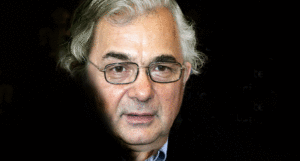 I choose to pick one among the living, if only to reduce the numbers. Allowing myself to be utterly unfair to so many absolutely incredible human beings, I choose Noam Chomsky. He is a linguist who invented the modern study of linguistics including the evolution and structure of language. His biological and mathematical concept of Universal Generative Grammar as a functional rather than physical organ of the human brain is on a par with Einstein’s relativity theory in terms of its scientific, philosophical and political implications.
I choose to pick one among the living, if only to reduce the numbers. Allowing myself to be utterly unfair to so many absolutely incredible human beings, I choose Noam Chomsky. He is a linguist who invented the modern study of linguistics including the evolution and structure of language. His biological and mathematical concept of Universal Generative Grammar as a functional rather than physical organ of the human brain is on a par with Einstein’s relativity theory in terms of its scientific, philosophical and political implications.
Chomsky has also been one of the great human rights activists and political commentators of the modern era. He has written with incomparable accuracy, clarity, depth and integrity about US foreign and domestic policies, including the crimes its elite power structure has perpetrated on its own people, Latin America, the Middle East, Vietnam, and so on. He has, similarly, exposed the US state, military and political system as the primary cause of the existential threats to human life that are now emerging as subjects of urgent discussion all over the world.
Chomsky remains an optimist, but warns that a global awakening will be essential for human survival to become a viable political project. He is a global treasure.
Zubeida Mustafa, journalist
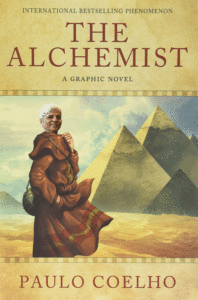 I would love to be Santiago, from Paulo Coelho’s, The Alchemist. Santiago is introduced by Coelho as “the boy” and that is how he is referred to throughout this charming allegorical book. The boy is a shepherd who goes to school in Andalusia but then adopts the nomadic lifestyle he loves, learning about life from his sheep that he is fond of and his wanderings in the meadows of Spain and the deserts of north Africa. I would love to move away from the maddening civilisation we live in and connect with Nature. That is how I could follow my “dream” as the boy did.
I would love to be Santiago, from Paulo Coelho’s, The Alchemist. Santiago is introduced by Coelho as “the boy” and that is how he is referred to throughout this charming allegorical book. The boy is a shepherd who goes to school in Andalusia but then adopts the nomadic lifestyle he loves, learning about life from his sheep that he is fond of and his wanderings in the meadows of Spain and the deserts of north Africa. I would love to move away from the maddening civilisation we live in and connect with Nature. That is how I could follow my “dream” as the boy did.
Twice the boy had a dream of a treasure that was buried near the pyramids in Egypt. After a long and tedious journey full of excitement and adventure he finds his treasure. But not near the pyramid but at the base of a sycamore in the yard of the same abandoned church where he had spent the night at the start of his long journey that took him to Egypt. The omen he received at the base of the pyramids took him back, having strange encounters with people of all sorts. He learnt wisdom from them but retained faith in his dream and remained firm about listening to his heart.
This is a typical case of “mind over body” and how important it is to discover one’s hidden strength.


